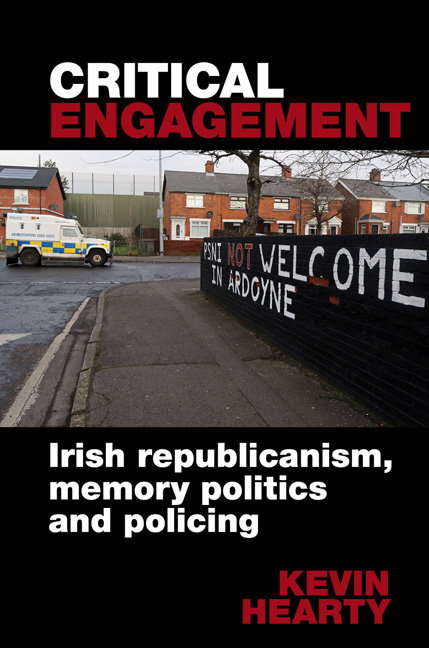Book contents
- Frontmatter
- Contents
- Acknowledgements
- List of Figures and Tables
- List of Abbreviations
- Introduction
- 1 Understanding a Fraught Historical Relationship
- 2 Irish Republican Memory as Counter-Memory
- 3 Ideology and Policing
- 4 The Patriot Dead
- 5 Transition, ‘Never Again’ and ‘Moving On’
- 6 The PSNI and ‘Community Policing’
- 7 The PSNI and ‘Political Policing’
- Conclusion
- References
- Index
7 - The PSNI and ‘Political Policing’
- Frontmatter
- Contents
- Acknowledgements
- List of Figures and Tables
- List of Abbreviations
- Introduction
- 1 Understanding a Fraught Historical Relationship
- 2 Irish Republican Memory as Counter-Memory
- 3 Ideology and Policing
- 4 The Patriot Dead
- 5 Transition, ‘Never Again’ and ‘Moving On’
- 6 The PSNI and ‘Community Policing’
- 7 The PSNI and ‘Political Policing’
- Conclusion
- References
- Index
Summary
Introduction
Establishing the overarching contexts of institutional crossover and heightened usage of ‘anti-terror’ legislation within which competing ‘political policing’ narratives are fashioned, this chapter conducts a thematic examination of how these opposing narratives are framed. The ‘critical engagement’ narrative is premised on the notion of rupture and assertions of change. It comprises themes such as disaggregating the policing monolith, proactively fighting the ‘roll back’ and of police reform being a component of an ongoing process of wider equality-based transformation. Although this narrative uses memory to draw a boundary between present and past policing, there is nonetheless an element of fluidity in its use of memory that blurs the lines of any neat separation by importing critical agitation from prior republican memory to frame current strategic interaction. Conversely, the narrative of opponents is again premised on continuity, and encompasses themes such as the continued abuse of ‘antiterror’ legislation, the retention of RUC ‘political policing’ methods and the refined targeting of Irish republicans by the PSNI. In order to construct this narrative, critics use memory to draw a line of continuity between their current lived experience of the PSNI and previous individual and collective experiences with the RUC. They construct this narrative through ideological appeals with a basis in deeper cultural memory that is more conducive to their masternarrative position and through adoption of wider human rights discourse in a global post-9/11 climate.
Institutional crossover
Competing narratives are not constructed in an apolitical vacuum but against a politicised backdrop of contestation over police reform. Given that these narratives are built on assertions or denials of change, it is unsurprising that institutional crossover underpins them. More fundamentally, this reflects the reality of police reform in Northern Ireland, in that while many within the RUC availed themselves of the Patten ‘golden handshake’ many others transferred into the PSNI. This is problematic because, as seen with reform processes elsewhere, those forces exhibiting crossover from discredited successor forces become susceptible to claims of being tainted by the old. While the nature of the conflict and policing problems in the North of Ireland and the political climate that spawned reform may differ from other cases, police reform here has not been immune from such criticism.
- Type
- Chapter
- Information
- Critical EngagementIrish republicanism, memory politics and policing, pp. 217 - 248Publisher: Liverpool University PressPrint publication year: 2017



